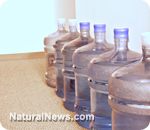 Four dollars for a gallon of gas is ridiculous enough, but $4 for a gallon of water could someday became a reality, that is if oil tycoons like T. Boone Pickens and water bottling companies have their way. Privatization of water in which companies control the public's water sources and free water is a thing of the past appears to be what Pickens and corporations such as Monsanto, Royal Dutch Shell, and Nestle are banking on to increase their vast fortunes.
Four dollars for a gallon of gas is ridiculous enough, but $4 for a gallon of water could someday became a reality, that is if oil tycoons like T. Boone Pickens and water bottling companies have their way. Privatization of water in which companies control the public's water sources and free water is a thing of the past appears to be what Pickens and corporations such as Monsanto, Royal Dutch Shell, and Nestle are banking on to increase their vast fortunes.
Four dollars for a gallon of water? The dream of Monsanto and other corporations wanting to privatize water
Fracking causes earthquakes, studies confirm
 Two separate studies are providing insights into the earth-shaking consequences of the controversial gas extraction process known as fracking.
Two separate studies are providing insights into the earth-shaking consequences of the controversial gas extraction process known as fracking.
Both studies confirm that hydraulic fracturing, or fracking, can trigger manmade earthquakes. The process involves blasting water, sand and chemicals deep into the ground to fracture rock to obtain oil and natural gas.
Experts: Another BP-style Gulf blowout all too possible

The presidential oil spill commission disbanded after it finished its main report last year, but its seven members recently got together again to look back on whether their recommendations had been carried out. Many steps to prevent or sop up another oil blowout haven’t been taken.
As air pollution from fracking rises, EPA to set rules
 The rush to capture natural gas from hydraulic fracturing has led to giant compressor stations alongside backyard swing sets, drilling rigs in sight of front porches, and huge flares at gas wells alongside country roads.
The rush to capture natural gas from hydraulic fracturing has led to giant compressor stations alongside backyard swing sets, drilling rigs in sight of front porches, and huge flares at gas wells alongside country roads.
Air pollution from fracking includes the fumes breathed in by people nearby, as well as smog spread over a wide region and emissions of the greenhouse gas methane.
Former Bush EPA chief, Christine Todd Whitman, sounds alarm on chemical security

Whitman, who led the EPA under George W. Bush, suggests the agency use its authority to seal gaps in "extremely limited" Department of Homeland Security rules designed to prevent releases of toxic chemicals, according to an April 3 letter she wrote to Jackson that was obtained by the Center for Public Integrity.
Something Fishy: CRS Report Downplays Fukushima’s Effect on US Marine Environment
 Late Thursday, the United States Coast Guard reported that they had successfully scuttled the Ryou-Un Maru, the Japanese “Ghost Ship” that had drifted into US waters after being torn from its moorings by the tsunami that followed the Tohoku earthquake over a year ago.
Late Thursday, the United States Coast Guard reported that they had successfully scuttled the Ryou-Un Maru, the Japanese “Ghost Ship” that had drifted into US waters after being torn from its moorings by the tsunami that followed the Tohoku earthquake over a year ago.
The 200-foot fishing trawler, which was reportedly headed for scrap before it was swept away, was seen as potentially dangerous as it drifted near busy shipping lanes.
The Top Short-Term Threat to Humanity: The Fuel Pools of Fukushima
 Scientists say that there is a 70% chance of a magnitude 7.0 earthquake hitting Fukushima this year, and a 98% chance within the next 3 years.
Scientists say that there is a 70% chance of a magnitude 7.0 earthquake hitting Fukushima this year, and a 98% chance within the next 3 years.
Given that nuclear expert Arnie Gundersen says that an earthquake of 7.0 or larger could cause the entire fuel pool structure collapse, it is urgent that everything humanly possible is done to stabilize the structure housing the fuel pools at reactor number 4.
More Articles...
- Chernobyl disaster gave football star Stiliyan Petrov cancer, claims Bulgarian doctor
- Fukushima Daiichi Site: Cesium-137 is 200 times greater than at Chernobyl Accident
- Monsanto’s Roundup Altering the Physical Shape of Amphibians
- Shale Shocked: ‘Remarkable Increase’ In U.S. Earthquakes ‘Almost Certainly Manmade,’ USGS Scientists Report
Page 112 of 201

 Environmental Glance
Environmental Glance






























